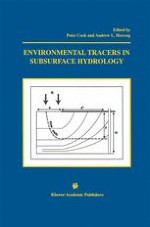2000 | OriginalPaper | Chapter
Chlorofluorocarbons
Authors : L. Niel Plummer, Eurybiades Busenberg
Published in: Environmental Tracers in Subsurface Hydrology
Publisher: Springer US
Included in: Professional Book Archive
Activate our intelligent search to find suitable subject content or patents.
Select sections of text to find matching patents with Artificial Intelligence. powered by
Select sections of text to find additional relevant content using AI-assisted search. powered by
Chlorofluorocarbons (CFCs) are stable, synthetic, halogenated alkanes, developed in the early 1930s as safe alternatives to ammonia and sulphur dioxide in refrigeration. Production of CFC-12 (dichlorodifluoromethane, CF2C12) began in 1931 followed by CFC-11 (trichlorofluoromethane, CFC13) in 1936. Many other CFC compounds have since been produced, most notably CFC-113 (trichlorotrifluoroethane, C2F3C13). CFCs are nonflammable, noncorrosive, nonexplosive, very low in toxicity, and have physical properties conducive to a wide range of industrial and refrigerant applications. Primary uses of CFC-11 and CFC-12 include coolants in airconditioning and refrigeration, blowing agents in foams, insulation, and packing materials, propellants in aerosol cans, and as solvents. CFC-113 has been used primarily by the electronics industry in manufacture of semiconductor chips, in vapour degreasing and cold immersion cleaning of microelectronic components, and as a solvent in surface cleaning procedures (Jackson et al., 1992). Release of CFCs to the atmosphere and subsequent incorporation into the Earth’s hydrologie cycle has closely followed production. For example, it has been estimated that CFC-11 and CFC-12 produced for aerosol propellants were released, on average, within 6 months of sale (Gamlen et al., 1986), and emissions of CFCs used as blowing agents in open-cell foams and extruded foams took place within less than 1 year (Midgley and Fisher, 1993). CFCs used in refrigeration and airconditioning have somewhat greater storage times, being released on average within 1 to 10 years, and CFCs used as blowing agents in closed-cell thermoset foams are released after more than 10 years (Midgley and Fisher, 1993). Current estimates of the atmospheric lifetimes of CFC-11, CFC-12, and CFC-113 are 45 ± 7, 87 ± 17, and 100 ± 32 years (Volk et al., 1997).
